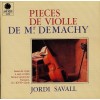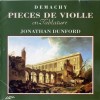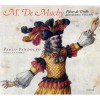Composers
Machy, known as Le Sieur de Machy (fl. second half the 17th century) was a French viol player, composer, and teacher remembered principally for his Pièces de Violle en Musique et en Tablature (1685), a valuable source of information on the performance practices of his time.[1][2]
He studied with Nicolas Hotman. He resided in Paris from at least 1692. He described himself as the first composer whose viola da gamba works were published. This is not technically correct, as the collection Fantaisies pour les violles by Nicolas Metrus had already been published in 1642. These and other earlier pieces were, however, written for gamba consort, while Machy, in his Pièces de violle (1685), preferred polyphonic playing for solo gamba in the tradition of Nicolas Hotman, André Maugars and Jean de Sainte-Colombe. The eight surviving suites by Machy are printed half in notation and half in tablature. He preceded these suites with a technical introduction that has high historic value, as it lists the most important ornaments along with the methods of playing those instruments.
Recently Added
Biography
Machy, known as Le Sieur de Machy (fl. second half the 17th century) was a French viol player, composer, and teacher remembered principally for his Pièces de Violle en Musique et en Tablature (1685), a valuable source of information on the performance practices of his time.[1][2]
He studied with Nicolas Hotman. He resided in Paris from at least 1692. He described himself as the first composer whose viola da gamba works were published. This is not technically correct, as the collection Fantaisies pour les violles by Nicolas Metrus had already been published in 1642. These and other earlier pieces were, however, written for gamba consort, while Machy, in his Pièces de violle (1685), preferred polyphonic playing for solo gamba in the tradition of Nicolas Hotman, André Maugars and Jean de Sainte-Colombe. The eight surviving suites by Machy are printed half in notation and half in tablature. He preceded these suites with a technical introduction that has high historic value, as it lists the most important ornaments along with the methods of playing those instruments.





